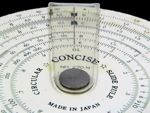 While I've discussed methods of calculations numerous times, I haven't talked much about the means.
While I've discussed methods of calculations numerous times, I haven't talked much about the means.
The oldest calculating device would probably be the abacus.
In the west, however, the most popular calculating device, for the early part of the 20th century, was the slide rule. If you're not familiar with them, Eric's Slide Rule Site features a wonderful introduction to them. Once you get used to the idea of logarithms, they're easier to understand. This YouTube explanation of slide rules may help you understand further.
Once you've read and understand about slide rules, you may want to try them out yourself. You can try out the UniVirtual Slide Rule (Java required) or even try out different slide rule models (Javascript required). If you prefer to run a slide rule application on your system, you can download Caveman's Calculator for Mac OS X or Slide Rule 1.1 for any system.
Once you get the basics down, you can even learn a few slide rule tricks to make your work easier.
The death knell for the slide rule, of course, was the modern electronic calculator. Most operating systems today even come with a virtual calculator. The modern calculator is worth exploring further. You may not even realize that the calculator with your operating system can be switched into other modes of which you may not be aware (See here and here).
You can download numerous other calculators, depending on your goals. For example, let's say you wanted to show off your ability to multiply two 9-digit numbers in your head. In this case, you would need a high-precision calculator, such as the Magic Number Machine for Mac users or the Precise Calculator for Windows users. The variety of specialized calculators is truly mind-boggling.
That covers the past and present of calculators, but what about the future? The most amazing version of a future calculator that I've seen is the one in this video:
You may be thinking that this free-form calculator is simply a pipe dream, but it is available as a free download (Java required) from Weapons of Math Construction.
That's enough for now. I've given you plenty of calculators to play with, so I'll let you go play.




No Response to "Calculators: Past, Present and Future"
Post a Comment